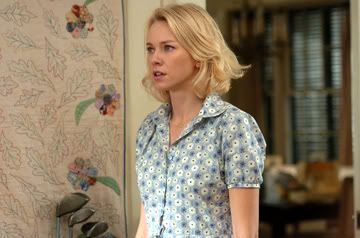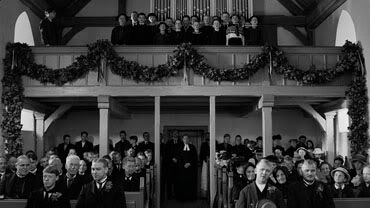Funny Games (2008)


Movies have the ability to manipulate an audience's expectations and twist their logic right around. In the case of "Funny Games," this is a movie that superimposes a game into the game of the genre it's making a statement about. The movie is a weapon against its own audience, and it puts not only its characters under tough conditions but also its viewers. It's an evening out that will screw with your head and, however much you may dislike it, it will stick with you.
"Funny Games" is a nearly shot-for-shot English-language remake of writer-director Michael Haneke's original 1997 German movie of the same name. It's a twisted thriller that is meant to be a commentary on the casual bloodlust we see in many horror films today. No, Haneke is no moralist as, with this film, he's basically a sadist condemning sadism. Nonetheless, nobody can call him a hypocrite because, contrary to popular belief, the violence is kept to a minimum. Most of the violence is done through the use of harrowing off-screen violence, which is actually more effective. I've heard so much about how this mockingly sadistic movie is just as equally vile, awful, and disgusting as any other American horror movie. It has been considered an equivalent to "Hostel," but it's absolutely not. Those going to see this movie looking for "torture porn" are going to be receiving a rude awakening.
The premise is this: An upper-class American family--mother Anna (Naomi Watts), father George (Tim Roth), and young son Georgie--goes on a vacation to their summer cottage. While unpacking and preparing everything for their leisurely stay, Anna gets news from her son that there's somebody at the screen door. It's a young man named Peter (Brady Corbet) who stops by wanting to borrow four eggs. Upon receiving them, he drops them. There's something creepy about the way he's acting, and we know something is wrong. He is soon joined by an even more unsettling young man named Paul (Michael Pitt) who is polite yet demanding. Anna requests for the two men to leave, but then enters George who asks to be explained what is happening. Things get heated, and next thing we know, dad gets smacked in the leg with a driver.
The two men who arrive to the family's home are more archetypes than actual people. They show up wearing short shorts, canvas shoes, white sweaters, and white gloves. They come with a simple game to play betting that in the next 12 hours, Anna, George, and Georgie will all be dead. And so begins their passive-aggressive, disturbingly kind and genteel torture techniques that have absolutely zero motivational reasoning. Anna asks, "Why don't you just kill us?" leaving Peter to remind her to never forget the importance of entertainment. The point is clearly made about the notion that violence is now considered a harmless game, and there's an underlying stream of bleak and twisted humor that emphasizes the movie's sideways nihilism.
We're forced to sit back and watch as the two young men put a pillowcase over the son's head and force mom to strip down all while dad watches with a bleeding leg. They play a cruel game of hide-and-seek with the body of the family's golden retriever that they beat to death. During this moment, Paul turns and looks to the camera. This isn't the only case where he addresses the audience, making side remarks, asking us what we want to see happen next. In one bizarre sequence, he actually "rewinds" a scene, allowing us to see how the scene could've gone two ways. We witness the crowd-pleasing moment and then watch as it gets taken back, stripping us of our Hollywood ending. It's at that moment we realize we've been sucker-punched, unable to cheer for the good guys, and that's exactly what Haneke has intended.
Similar to Haneke's "Caché," there are some importantly placed shots that create nerve-rattling tension. There are moments of uncomfortably long takes, especially during one scene where there is the annoyingly loud drone of a NASCAR telecast in the background that's like nails on a chalkboard. It keeps you on the edge of your seat, like everything else in the movie, because it's ultimately meant to be an unpleasant experience. Haneke makes a statement about how violence and torture are now an acceptable form of entertainment through making a movie that basically demonstrates the same thing while being anything but entertaining.
While Naomi Watts serves as executive producer, she also gives a shockingly raw performance. There is a point in the movie where we watch for a good 10 minutes Anna struggling to stand after the psychopaths have left her family's house. This sequence continues to go on for a long while, and a few people began leaving the theater during this portion of no violence. Seeing this movie is a lose-lose situation because if you leave the theater there, you're a bad person, but if you stay for the rest, you're still a bad person. We rightfully become irritated with whose left of the family, and by the end of it all, we realize we just witnessed something awful, but worse yet, we also realize it's exactly what we were waiting for.
It's entirely reasonable to despise Michael Haneke's mean and manipulative remake of his own film, and I'm sure many people will hate it. I mean, I hate it myself but only because it nailed me. The movie won, and it got me. It's meant to play a trick on you, and in that, it succeeds. I'm not recommending this film to anyone because it's not actually particularly enjoyable, but I'm also not dismissing it. "Funny Games" is certainly not entertainment, but it is an experience.






